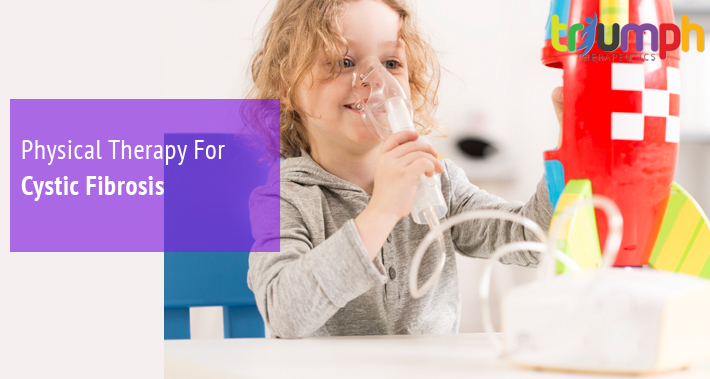Physical Therapy For Cystic Fibrosis
https://www.triumphtherapeutics.com/wp-content/uploads/2022/03/Triumph-Therapeutics-Speech-Therapy-OT-Physcial-Therapist-Washington-DC-Feb03-01-2022.jpg 710 379 Triumph Therapeutics Triumph Therapeutics https://www.triumphtherapeutics.com/wp-content/uploads/2022/03/Triumph-Therapeutics-Speech-Therapy-OT-Physcial-Therapist-Washington-DC-Feb03-01-2022.jpgCystic fibrosis is an inherited, progressive disorder.
It can be a challenging disorder that requires daily care in order to manage it.
The good news is that screening and treatment has improved so much in recent decades that people with cystic fibrosis live longer and healthier lives than they used to.
The important thing is to find out if your child has it early enough so a Washington DC pediatric physical therapy clinic can give them the training required for their daily management of symptoms.
But for now, let’s find out more.
What Is Cystic Fibrosis?
Cystic fibrosis is a progressive, inheritable disorder that severely damages your lungs, digestive system, and other organs.
It does this by targeting the cells that produce mucus, sweat, and digestive juices.
Normally, these fluids are thin and slippery because they are meant to lubricate your body.
Instead, if you have cystic fibrosis, these fluids are sticky and thick which causes them to plug up your tubes, ducts, and passageways.
The effects of this are felt in your lungs and pancreas the most.
Cystic fibrosis requires daily care in order to manage the disorder.
Symptoms Of Cystic Fibrosis
You’ll have a higher than normal level of salt in your sweat if you have cystic fibrosis.
It’s high enough that you would be able to noticeably taste it when you kiss your child if they have the disorder.
Otherwise, the symptoms of cystic fibrosis can be grouped into respiratory and digestive symptoms.
Respiratory symptoms include:
- Persistent coughing accompanied by thick mucus
- Exercise intolerance
- Wheezing
- Repeated lung infections
- Recurrent sinusitis
- Inflamed nasal passages
Digestive symptoms include:
- Poor weight gain
- Poor growth
- Intense smelling, greasy stools
- Intestinal blockage in newborns especially
- Chronic constipation that progresses to a rectal prolapsed
As a result, your child may miss certain developmental milestones.
What Causes Cystic Fibrosis?
A mutation in the cystic fibrosis transmembrane conductance regulator gene causes cystic fibrosis by changing a protein that regulates the movement of salt in and out of your cells.
The type of mutation dictates the severity of the disorder.
A child needs to inherit one copy of the gene from each parent in order to have cystic fibrosis.
If they only inherit one, they won’t develop the disorder, but they will be a carrier for it and could pass it along to their child.
How Can Physical Therapy For Cystic Fibrosis Help?
Physical therapy for cystic fibrosis is an integral part of the daily treatment required to keep you or your child fit and healthy.
There are a number of strategies they can teach you to help manage your disorder.
Plus, many of these strategies can be started as young as infancy.
The type of physical therapy recommended to you or your child will be tailored to your needs.
Let’s find out more about some common strategies your physical therapist can recommend to you to manage cystic fibrosis.
1. Airway Clearance
Airway clearance is the number one most important strategy your physical therapist can teach you to manage your cystic fibrosis.
The reason for this is because airway clearance helps to stop thick mucus from building up and blocking your lung airways.
This helps to both reduce infection and slows damage to your lungs.
Now, there are a number of different airway clearance techniques your physical therapist can teach you.
This is because everyone’s chest is a little different and so your physical therapist will work with you to figure out which technique works best for you at a given point in your life.
Some techniques requiring no external equipment include:
- Active cycle of breathing techniques – a cycle of deep breathing, huffing, coughing, and relaxed breathing to move the mucus in your chest
- Autogenic drainage – controlled breathing at different levels moves mucus from smaller to bigger airways
Some techniques requiring external equipment include:
- Positive expiratory pressure – breathing out through a mask against a resistance which builds up pressure to move mucus
- High frequency chest wall oscillation – an electric air pulse generator vibrates your chest by its connection to an inflatable vest
The duration and times of airway clearance sessions will vary depending on your physical therapist’s recommendation and your current state.
For example, you might need to do more if you have a chest infection.
2. Exercises
Exercising is great for general fitness, well being, and bone health.
It’s been shown to be important for the long term management of cystic fibrosis.
It’s also been shown to be effective as part of an airway clearance routine.
Exercising helps to loosen mucus in your lungs, which makes the airway clearance techniques work faster.
Your physical therapist can recommend specific exercises to you.
3. Posture Improvements
Poor posture can lead to back pain and can impact your lung function.
For this reason, it’s important for you to maintain good posture throughout your life.
Your physical therapist can also treat any back pain you might have and offer strategies for posture improvement.
4. Helping With Incontinence
A physical therapist is a great resource to help with incontinence while coughing.
If you start to experience this, it’s important to work with them and be up front about what you’re experiencing.
They can teach you pelvic floor exercises to help and may even refer you to a specialist if they think you need more support.
Book Your Appointment With Triumph Therapeutics Today
You can see the many number of ways working with a physical therapist can help if you or your child has cystic fibrosis.
The important thing is to seek treatment as soon as possible in order to manage this lifelong disorder.
Book an appointment today with Triumph Therapeutics to schedule an evaluation.


